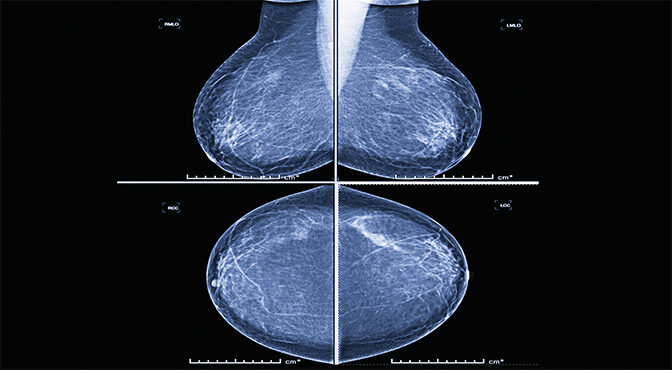Mammograms Should Remain A Priority Even In Uncertain Times Breast Health
The pandemic has thrown things into disarray, causing most people to change habits and delay plans. But one activity women should not postpone is getting a mammogram. Cancer won’t wait until the pandemic ends.
“We advocate annual screenings because patients have better outcomes if we catch cancer early. That hasn’t changed,” said radiologist Dr. Kathy Schilling, medical director of the Christine E. Lynn Women’s Health & Wellness Institute at Boca Raton Regional Hospital. “There are more treatment options in the early stages — less aggressive therapies if we find things when they are small and detected early.”
At the center of the region’s COVID-19 response, Boca Regional has played a pivotal role in ensuring the safety of the community — caring for the sick, working at the forefront of local efforts to investigate treatments and speaking out about the importance of protective measures. At the same time, keeping in mind the wider healthcare picture, the hospital has upheld the highest-quality care in emergency medicine, women’s health and more.
Breast cancer screenings were among the elective procedures that were put on hold in March under state and federal guidelines, creating a backlog for thousands of women. However, those restrictions have been lifted for several months now. If you haven’t had a mammogram since last year, it’s time to make that appointment.
“Some women may be tempted to say, ‘I’m going to skip this year, and I’ll just go back next year when things are a little bit better.’ We don’t want that to happen,” Schilling said. “We don’t want a delay of a few months to turn into a year. We will see bigger, palpable breast cancers if patients don’t come in for their screenings.”
Statistics show that one in eight women will develop breast cancer at some point in their lives. Despite advances, it is the second-leading cause of cancer death among women. Experts estimate that in 2020, there will be 276,480 new cases of invasive breast cancer diagnosed in the U.S. and more than 42,170 breast cancer deaths.
While mammograms don’t prevent breast cancer, they can save lives by detecting it before a lump can be felt. When found in the early stages while breast cancer is still localized, the five-year survival rate is 99 percent.
Although concerns about COVID-19 might be at the forefront right now, that should not derail regular health screenings or medical care. Even if mammograms have never detected problems in the past, patients can’t assume they’re in the clear for the future. Cancers grow at different rates, and a “normal” mammogram one year is no guarantee that things won’t change the next time.
“Annual screenings are really important. They have helped us cut the mortality of breast cancer over the years by 40 percent,” Schilling said. “We have to maintain the screening protocols or we will lose the gains from the past. Without timely screening, we’re going to see a lot more patients presenting with larger cancers that require more aggressive therapies and more radical surgeries.”
The institute’s Schmidt Family Center for Breast Care uses the most advanced, state-of-the-art imaging equipment to get 3-D breast scans. The innovative Senographe Pristina produces faster and more detailed pictures than traditional X-ray images. The equipment was designed for patient comfort, with gentle, rounded corners and contoured armrests instead of handgrips to enhance relaxation. In addition, control can literally be in the hands of the patient with the Dueta remote device, which allows patient-initiated compression for a more comfortable mammogram.
New this year, revolutionary “artificial intelligence” software is assisting radiologists in detecting abnormalities with unrivaled accuracy, resulting in 8 percent higher cancer detection rates and 7 percent fewer false-positive exams.
“We opened with the simple mission of saving lives through early cancer detection,” said Schilling, noting that the Schmidt Center is celebrating its 30th anniversary this year. “Thanks to innovative technologies and treatments, clinical research and partnerships with skilled professionals, we are doing just that.”
In 2019, for example, the percentage of breast cancer cases the Lynn Women’s Institute caught in the early stages was 72 percent. The national percentage was 49 percent.
Patients can return to the Schmidt Center’s three locations with confidence, knowing that safeguards are in place to prevent exposure to the virus. In addition to contactless registration, enhanced cleaning and social distancing in the lobby, the center is taking safety steps such as doubling the time between appointments and having patients undress alone in the exam room rather than in a common changing room. Everyone, including all staff, must wear a mask.
“Patients shouldn’t be fearful,” Schilling said. “They can trust that we are doing everything we possibly can to protect them.”
Don’t allow finances to deter you, either. If you have no health insurance due to pandemic-related layoffs or for any other reason, you may qualify for assistance to get a mammogram. The institute has generous donors and outstanding community support from organizations such as PinkBall, a group of local “baseball moms” who raise money to help cover breast care for underinsured or uninsured women. For more information about financial assistance, call (561) 955-4294.
“We are here to provide women unparalleled care for every stage of life,” Schilling said. “We address a woman’s unique medical needs with unrelenting attention to clinical excellence, patient satisfaction and patient safety.”
Learn more about Boca Raton Regional Hospital’s Christine E. Lynn Women’s Health & Wellness Institute at www.brrh.com/services/lynn-womens-institute. To request an appointment at a Baptist Health diagnostic imaging location, call (786) 573-6000 or visit www.baptisthealth.net/breasthealth For other questions, call the patient care coordinator at (561) 955-7130.
